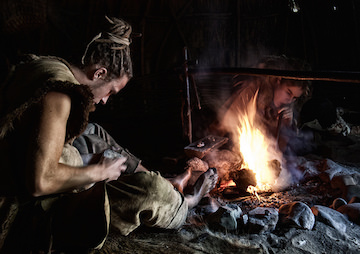Study Shows Gender Equality Prevailed Among Prehistoric People
A review of the way gatherer-hunters live in our own time suggests that the gender inequality observed today did not exist for the vast majority of our evolutionary history. hans s / (CC BY-ND 2.0)
hans s / (CC BY-ND 2.0)
A review by anthropologists of the way gatherer-hunter societies are organized in our own time suggests that the gender inequality observed today did not exist for the vast majority of our evolutionary history and that prehistoric societies were fundamentally egalitarian.
Science correspondent Hannah Devlin writes at The Guardian: “A study has shown that in contemporary hunter-gatherer tribes, men and women tend to have equal influence on where their group lives and who they live with. The findings challenge the idea that sexual equality is a recent invention, suggesting that it has been the norm for humans for most of our evolutionary history.”
Devlin quotes Mark Dyble, an anthropologist who led the study at University College London, as saying: “There is still this wider perception that hunter-gatherers are more macho or male-dominated. We’d argue it was only with the emergence of agriculture, when people could start to accumulate resources, that inequality emerged.”
Dyble says the latest findings suggest that equality between the sexes may have been a survival advantage and played an important role in shaping human society and evolution. “Sexual equality is one of a (sic) important suite of changes to social organisation, including things like pair-bonding, our big, social brains, and language, that distinguishes humans,” he said. “It’s an important one that hasn’t really been highlighted before.” …
The authors argue that sexual equality may have proved an evolutionary advantage for early human societies, as it would have fostered wider-ranging social networks and closer cooperation between unrelated individuals. “It gives you a far more expansive social network with a wider choice of mates, so inbreeding would be less of an issue,” said Dyble. “And you come into contact with more people and you can share innovations, which is something that humans do par excellence.” …
The study suggests that it was only with the dawn of agriculture, when people were able to accumulate resources for the first time, that an imbalance emerged. “Men can start to have several wives and they can have more children than women,” said Dyble. “It pays more for men to start accumulating resources and becomes favourable to form alliances with male kin.” …
The findings appear to be supported by qualitative observations of the hunter-gatherer groups in the study. In the Philippines population, women are involved in hunting and honey collecting and while there is still a division of labour, overall men and women contribute a similar number of calories to the camp. In both groups, monogamy is the norm and men are active in childcare.
It should be added that in small groups of people who are entirely dependent on each other for their welfare — which has traditionally been the case with nomadic people — the ability of one subgroup to dominate another and sustain the arrangement would be extremely limited or nonexistent.
Read about the research in greater detail here.
— Posted by Alexander Reed Kelly.
Your support matters…Independent journalism is under threat and overshadowed by heavily funded mainstream media.
You can help level the playing field. Become a member.
Your tax-deductible contribution keeps us digging beneath the headlines to give you thought-provoking, investigative reporting and analysis that unearths what's really happening- without compromise.
Give today to support our courageous, independent journalists.






You need to be a supporter to comment.
There are currently no responses to this article.
Be the first to respond.